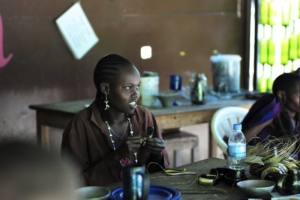Transforming Poverty With Innovative Recycling in the DRC
 The Democratic Republic of Congo (DRC) is the largest country in sub-Saharan Africa. It is rich in natural resources and diverse landscapes. However, despite the country’s affluent beauty, most citizens live below the poverty line. In fact, according to the World Bank, the DRC is one of the five most improvised nations in the world, with an estimated 73.5% of Congolese people living on less than $2.15 a day.
The Democratic Republic of Congo (DRC) is the largest country in sub-Saharan Africa. It is rich in natural resources and diverse landscapes. However, despite the country’s affluent beauty, most citizens live below the poverty line. In fact, according to the World Bank, the DRC is one of the five most improvised nations in the world, with an estimated 73.5% of Congolese people living on less than $2.15 a day.
Furthermore, due to ongoing political conflict in recent years, many of the DRC’s vital institutions, including hospitals and waste management systems, have been destroyed. The accumulation of waste in public spaces that this caused has resulted in skyrocketing rates of malaria and cholera, an additional humanitarian crisis that the DRC does not have the resources to alleviate.
However, by utilizing new sustainable technologies, particularly innovative recycling, several Congolese organizations are working to lessen the impact of waste on the DRC. Below are two stand-out nongovernmental organizations (NGOs) utilizing innovative recycling in the DRC to lower poverty rates and help lessen the country’s current crisis.
Plastycor
Plastycor was established in 2019 by Nicole Mugoli Menemene. The organization uses discarded plastic waste to create homes, furniture and other household appliances, including “chairs, walls with masonry and without masonry, bins and multipurpose baskets, flowers and flower pots, coasters,” and many more.
Inspired by her mother, who taught her early on about the importance of proper sanitation and waste disposal, Menemene got her start in environmental advocacy. After founding Plastycor, she quickly searched for ways to maximize her impact.
In addition to her work with innovative recycling in the DRC, she headed community training on proper waste disposal and youth programs that bring awareness to environmental issues and supported the founding of other new start-ups.
Despite her early success, Menemene has not stopped expanding her business. Today, she “oversees three permanent full-time staff members and [more than] 30 volunteers.” Thanks to the efforts of Menemene and her team, Plastycor has recycled 510,000+ pieces of plastic waste, trained 1,000+ individuals on proper waste disposal and collected 450+ tons of urban waste.
Benelux Afro Center
The Benelux Afro Center (BAC) is an organization that specializes in the correct disposal of e-waste. The project focuses on educating individuals and communities about the proper ways to dispose of e-waste, the collection of the hazardous waste itself and the shipping and recycling process. There are BAC stations in most large cities in the DRC, run by young people trained in the e-waste disposal process.
The BAC isn’t only an incredible resource in waste disposal. It also has a huge environmental and socioeconomic influence: “The project had recycled 13,500 kilograms of e-waste by 2017 and by 2021 had recycled nearly 141 tonnes of e-waste. Each relay station provides work for 10 young people, mostly from disadvantaged backgrounds.”
Finally, like Plastycor, the BAC does not only utilize traditional recycling. In addition, “metal waste is processed by the students and made into beds, chairs and benches. Waste is also transformed into gardening tools, such as rakes and spades.”
Final Remarks on Innovative Recycling in the DRC
Although the future seems bleak, countless organizations are leading the fight against poverty and injustice with innovative recycling in the DRC. If countries like the U.S. and England commit to supporting their progress, it is undeniable that improvement is possible.
– Helena Birbrower
Helena is based in Davis, CA, USA and focuses on Global Health and Politics for The Borgen Project.
Photo: Flickr
